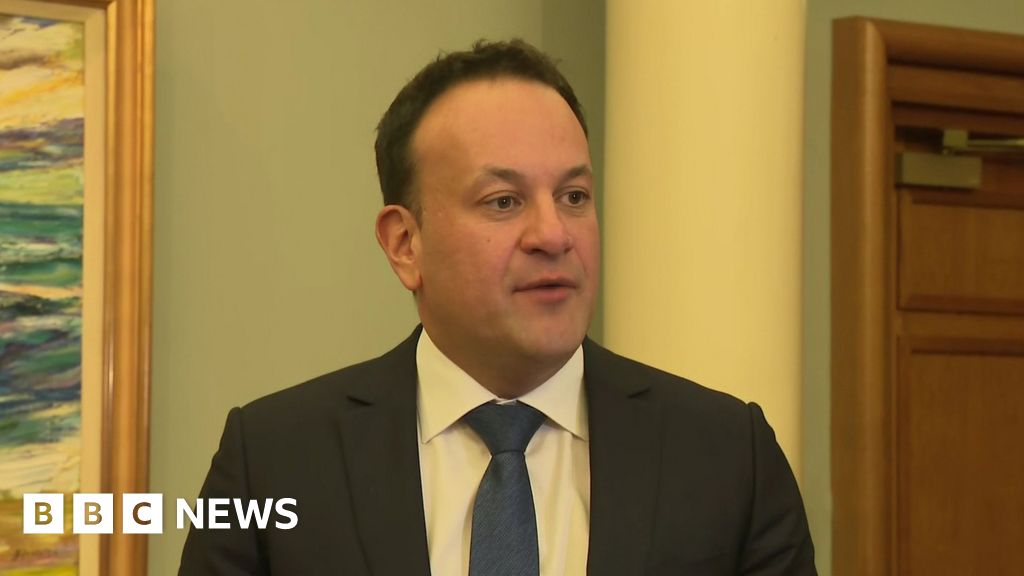Image source, Ronald Grant
Results from Friday’s referendum are expected to be announced later
Taoiseach (Irish Prime Minister) Leo Varadkar says “it is clear” that two referendums have been defeated.
Counting is continuing with results from some constituencies filtering through on proposed changes to the Irish Constitution.
Early indications show significant numbers of ‘no’ votes.
One change could alter the definition of family to include those not based on marriage, while the other could remove reference to women in the home.
In the first results announced, Cork South Central voted against the family amendment, while Dún Laoghaire voted narrowly in favour.
In Cork South Central, 61.4% voted ‘no’ and 38.6% voted ‘yes’.
Meanwhile, in Dún Laoghaire, 50.3% voted ‘yes’ and 49.7% voted ‘no’.
Leo Varadkar says the amendments have been “defeated comprehensively on a respectable turnout”
Mr Varadkar said it was clear both amendments had been “defeated comprehensively on a respectable turnout”.
He said the Irish government accepted the result and will “respect it fully.”
“As head of government and on behalf of the government, we accept responsibility for the result,” he said.
“It was our responsibility to convince the majority of people to vote ‘Yes’ and we clearly failed to do so.”
Earlier on Saturday Green Party Leader Eamon Ryan who campaigned for the changes, had said it looked like both questions would be defeated.
Green Party Leader Eamon Ryan says the result will have to be respected
Mr Ryan said: “It does look like a no vote in both the family and care referendums.
“The first thing to say is that we respect that. It’s the voice of the people and in our constitution, it’s the people who are sovereign.
“It’s they who decide what goes into our constitution.”
Mr Ryan, who was at the RDS count centre in Dublin said: “If it is a no vote in both, we will have to respect that.”
Sinn Féin leader Mary Lou McDonald was jeered by a small crowd and called “a traitor to the Irish people” as she arrived at Dublin Castle on Saturday.
Her party advocated for a “yes-yes” vote but she said the government had “come up short in terms of the caring wording” and there had been a “lack of clarity”.
Mary Lou McDonald says that her party is still “very much” in touch with the public
Ms McDonald said the people of Ireland had spoken “very, very definitively” but insisted her party were still “very much” in touch with the public.
“They disregarded the citizens assembly, they didn’t consult with opposition or with other stakeholders. They didn’t collaborate, and they failed to convince,” she said.
“I know, talking to lots of people, that people were left with an unbalanced decision to make and I think it’s a great pity that the government went on this kind of solo run, and they’ve had their answer.”
Ms McDonald added the “big takeaway” from the referendums is support for people with disabilities as full and equals citizens and support for carers is something that has to be taken seriously by government.
Ballots are continuing to be counted in twin Irish referendums
Turnout was mixed when polls closed at 22:00 local time on Friday night.
It reached 50% in some parts of the country, but remained below 30% elsewhere.
Government misjudged mood of electorate – McDowell
Senator Michael McDowell, who opposed changes to the constitution, said the results suggested a “no-no substantial margin right across the country”.
Mr McDowell who has served terms as tánaiste (deputy prime minister), justice minister and attorney general, said: “It seems like the government misjudged the mood of the electorate and put before them proposals which they didn’t explain, proposals which could have serious consequences.”
‘No’ tallies high – Tóibín
Aontú Leader Peadar Tóibín who also backed the no campaign, described the amendments as government “virtue signalling” with vague language.
Peadar Tóibín describes the amendments proposed as “virtue signalling”
He added:”And the Sinn Féin leadership look marooned from their former support base, from their votes and that’s a very dangerous place for Mary Lou and the Sinn Féin leadership to be.”
Fine Gael Senator Regina Doherty described it as an “insult” to the 100 members of the Citizens Assembly to describe the referendums as virtue signalling.
Those taking part in Friday’s referendum were presented with two ballots – one white and one green – and were asked to vote yes (Tá) or no (Níl).
Watershed moment for disabled citizens – Clonan
Senator Tom Clonan described the wording in the care referendum as “toxic” to the fundamental human rights of disabled citizens.
Mr Clonan, who has a 22-year-old disabled son, said he hoped there would now be a conversation about “ableism”.
“The State has been abject in its treatment of disabled citizens. We now have an opportunity to debate that going forward, and find ways to really bring ourselves in line with the rest of Europe and how we vindicate the rights of disabled citizens.
“I’m hoping that this is a watershed moment for disabled citizens.”
Those aged 18 or over and who ordinarily reside in Ireland, Irish citizens and those registered to vote were eligible.
What were voters asked about family?
The Irish constitution currently offers legal protections to the family unit, but ties the concept of family to the institution of marriage.
The amendment sought to expand the constitutional definition of family to include other “durable relationships”
The amendment sought to expand the constitutional definition of family to include other “durable relationships” such as unmarried couples and single parent families.
Supporters of the amendment – including the Irish government – said the change would ensure that all family units were recognised equal in the constitution.
However, opponents argued the term “durable relationship” is unclear and could have unintended legal consequences.
What is the Care amendment?
The green ballot asked voters to accept or reject the Fortieth Amendment of the Constitution Bill – or the Care amendment.
Currently the Irish constitution – or Bunreacht na hÉireann – says mothers should not have to go out into the workplace to the neglect of their “duties in the home”.
It also states that women’s “life within the home” is a source of support to the state which is necessary for the “common good”.
The amendment asked for both of these articles to be deleted and a new text to be added saying the state “shall strive to support” the provision of family-based care.

David Turner is a globe-trotting journalist who brings a global perspective to our readers. With a commitment to shedding light on international events, he explores complex geopolitical issues, offering a nuanced view of the world’s most pressing challenges.




/cdn.vox-cdn.com/uploads/chorus_asset/file/25449825/65cf71ee2368ff61aaf13de7_1.jpg)


